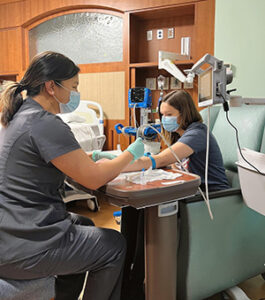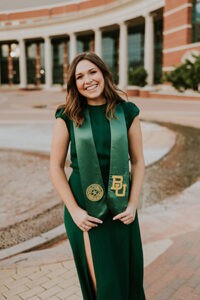In 2019, Sydney Duke, a freshman health science studies major at Baylor University, was eager to embark on her journey to become a physician and to improve the quality of life of others.
So, when she encountered a representative from Be the Match while walking through the Baylor Sciences Building one day, she was happy to put herself on the National Bone Marrow Donor registry.
Four years later, during her senior year at Baylor, Sydney received a call notifying her she was a match for someone with blood cancer. And she was not just one of several matches—as can be the case during the initial matching stages—she was the only match out of more than 19 million individuals in the United States Be the Match Registry for this particular patient.

“When they first called me, my gut reaction was, ‘Of course, I’ll do anything to help.’ My grandfather had lymphoma and my uncle died of lymphoma about 10 years ago. So, I was familiar with blood cancers,” she said.
For the next three months, Sydney underwent routine blood tests and physicals to ensure she was the best and healthiest match for the patient. Once this was confirmed, her procedure was scheduled, and just a few weeks later, the donation process began.
Following five days of injections to both boost and move her stem cells to her peripheral blood vessels, Sydney traveled with her mom to Chicago for the eight-hour peripheral blood stem cell collection procedure.
“The best way I can describe it is basically an auto-blood transfusion. It was uncomfortable and long, but very manageable and fulfilling,” she said. “Throughout the whole process, I was treated with such care and compassion by all of the hospital staff I interacted with.”
“As I believe we are called to love one another and truly lay down our lives for one another, I was honored to endure any slight discomfort if that meant someone out there got another chance at life. I would hope someone would do the same thing for me.”
When the procedure was finished, Sydney’s donation was whisked away to board a plane on its way to her matched patient. Per confidentiality policies, Sydney will have to wait at least a year before she has the opportunity to reach out to the recipient for an update and to request contact.
Sign up for our weekly edition and get all our headlines in your inbox on Thursdays
“Not hearing anything is normally good news. So, I’m hoping and praying everything went well on their end,” she said. “In a year, I definitely plan to reach out.”
New perspective gained on theology of suffering
While the procedure itself is now over, this experience has and will continue to impact Sydney as she begins her medical school journey.
Before and after her donation, Sydney shares how the process informed her class experience at Baylor, offering a perspective she may not have had. She points to her medical ethics course, which she took leading up to the procedure, and a theology of sufferingcourse, which she took afterward. She said her understanding of suffering was expanded—both through her own trials during the procedure and through the very tangible connection with her recipient.
“My education and going through this experience have really opened my eyes to things that I didn’t think I would ever see.”

Sydney also praises her Baylor community for their support during the experience. She was able to connect with an alumna who had also gone through the donation process to hear a personal testimony from a fellow Be the Match donor.
Her mentor, another Baylor alumna who is now in medical school, also provided encouragement, as did Tricia Blalock, director of the health science studies program.
“I call Dr. Blalock my ‘college mom.’ She’s incredible, and she’s always been there for me,” Sydney said. “I talked a lot about the process with her, and she helped walk me through the procedures to better understand what I was going to be going through.”
Sydney, who recently graduated from Baylor, will attend the University of the Incarnate Word School of Osteopathic Medicine in San Antonio.
She has also received a naval commission through the Health Professions Scholarship Program. Through this program, the U.S. Navy will cover Sydney’s medical school tuition, and she will have unique training opportunities throughout her course of study, including spending most of her rotations in Navy hospitals. After medical school, Sydney will have a naval residency before serving four years back to the Navy.
“I’ve always wanted to serve. Both of my parents are police officers. So, I’ve watched them serve their community growing up,” she said. “I’m really excited. I’ve wanted to serve, and I always knew I wanted to be a doctor, but I didn’t know that I could do both.”
Guided by Luke 12:48
As she looks toward medical school, Sydney reflects on her peripheral blood stem cell donation and the impact it will make on her for the rest of her life.
“Eight hours in a hospital bed allowed for a lot of deep reflection and thinking. While sitting in that bed and watching the snow fall through the window, I was constantly pondering about what it would be like to be on the other side of this donation,” she said.
“Throughout both college and this donation process, the verse Luke 12:48, ‘From everyone who has been given much, much will be demanded; and from the one who has been entrusted with much, much more will be asked,’ has remained at the forefront of my thoughts and motivation.
“The blessing of my good health allowed for the potential saving of another and more time on this Earth. This donation felt like my earthly duty and will forever be one of my life’s greatest blessings and honors.”
















We seek to connect God’s story and God’s people around the world. To learn more about God’s story, click here.
Send comments and feedback to Eric Black, our editor. For comments to be published, please specify “letter to the editor.” Maximum length for publication is 300 words.